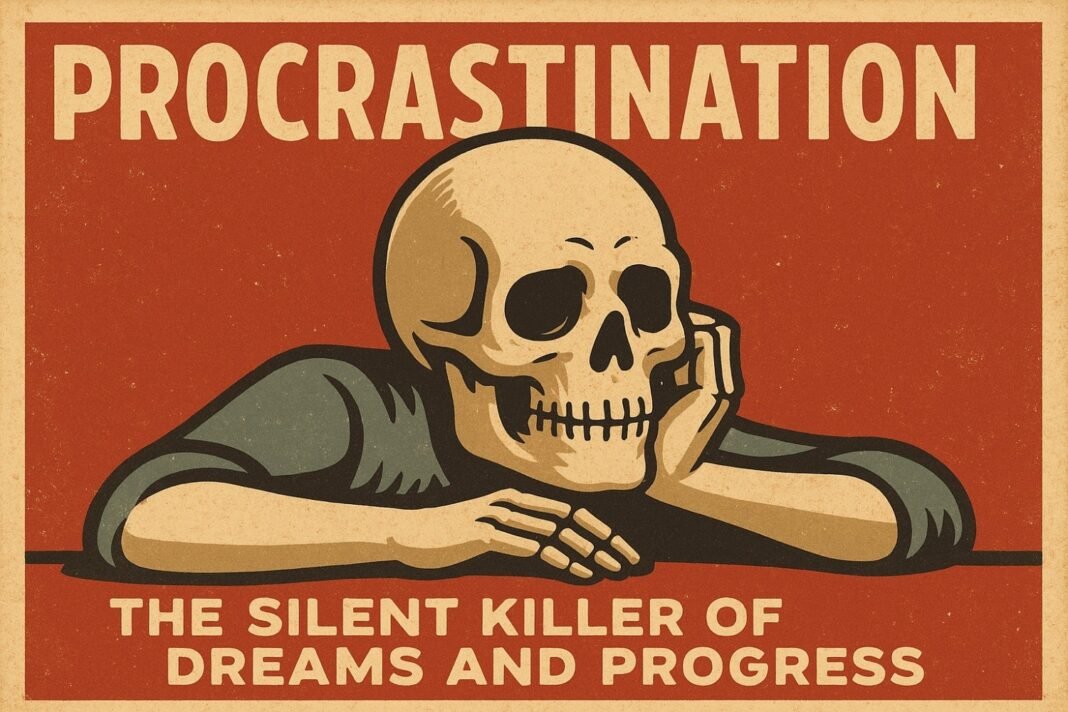What Is Procrastination?
Procrastination is often dismissed as a simple lack of time management or a harmless tendency to delay tasks. However, research shows that chronic procrastination is a deeper behavioral issue with serious psychological and practical consequences. At its core, procrastination is the act of delaying or postponing tasks despite knowing that such delays may lead to negative outcomes. According to Dr. Tim Pychyl, a psychologist at Carleton University and a leading authority on the subject, procrastination is less about laziness and more about emotional avoidance. People procrastinate to escape negative emotions—such as fear of failure, boredom, or anxiety—linked to certain tasks. As a result, it acts as a short-term coping mechanism that ultimately damages long-term goals and well-being.
How Procrastination Affects Life
The effects of procrastination can be widespread and deeply damaging. Academically, students who procrastinate tend to receive lower grades and experience higher levels of stress and anxiety. In professional settings, procrastination reduces productivity, lowers reliability, and can severely damage reputations. A 2023 study published in the Journal of Behavioral Science highlighted that chronic procrastinators often suffer from low self-esteem, depression, and even physical health issues brought on by poor lifestyle habits such as sleep deprivation, unhealthy eating, and a lack of exercise—all linked to stress.
In personal relationships, the damage is just as significant. Delaying important conversations, failing to meet commitments, or constantly pushing responsibilities aside can erode trust and lead to resentment. Over time, these patterns can strain marriages, friendships, and family ties. Additionally, unfinished tasks and constant delays burden individuals with feelings of guilt and helplessness, further damaging their self-image and mental health.
Perhaps most alarmingly, procrastination contributes heavily to long-term failure. It can trap individuals in a cycle of fear and avoidance: tasks are delayed out of fear of failure, the delay increases the chance of poor outcomes, and those failures reinforce the original fears. Many capable and talented people fail to reach their potential—not due to a lack of skill, but because procrastination consistently sabotages their progress and opportunities.
How to Overcome Procrastination
Recognizing procrastination as a serious issue is the first step toward overcoming it. It cannot be resolved through willpower alone; instead, it requires a deliberate change in mindset and behavior. Experts suggest several practical strategies. One proven method is setting “implementation intentions,” where individuals decide in advance when, where, and how they will begin a task. This creates a clear plan and reduces the mental friction associated with starting.
10 effective steps to overcome procrastination, based on research in psychology and productivity:
1. Acknowledge That You’re Procrastinating
The first step is self-awareness. Be honest with yourself about whether you’re delaying tasks unnecessarily. Notice when you’re doing low-priority activities (like scrolling on your phone or organizing your desk) instead of what really needs to be done.
2. Identify the Root Cause
Ask yourself why you’re avoiding the task:
-
Is it boring?
-
Are you afraid of failing?
-
Does it feel overwhelming?
Understanding the emotional reason behind your procrastination helps you address the real problem, not just the behavior.
3. Break Tasks Into Smaller Steps
Large tasks often feel intimidating. Break them into smaller, manageable parts. Instead of saying “Write the report,” start with “Create a title,” then “Write the introduction.” Small wins help build momentum.
4. Use the 2-Minute Rule
If a task takes less than two minutes, do it immediately. For longer tasks, commit to working on it for just two minutes. Often, starting is the hardest part—once you begin, you’re likely to keep going.
5. Create a Structured Schedule
Plan your day or week in advance. Allocate specific time blocks for important tasks. Using tools like planners, calendars, or apps (like Todoist or Notion) can help keep you on track.
6. Eliminate Distractions
Find a quiet workspace, turn off notifications, and put your phone away. Use website blockers (like Cold Turkey or Freedom) if you tend to browse when avoiding work.
7. Use the Pomodoro Technique
Work in focused intervals—25 minutes of work followed by a 5-minute break. After four sessions, take a longer break. This method boosts focus and prevents burnout.
8. Set Clear Deadlines (Even If None Exist)
If a task has no deadline, create one for yourself. Having a target date—even a soft one—creates urgency and accountability.
9. Reward Yourself for Progress
Positive reinforcement works. After completing a task or a work session, reward yourself with something enjoyable—a walk, a treat, or a short break.
10. Practice Self-Compassion
Don’t beat yourself up for procrastinating. Guilt and shame can increase avoidance. Instead, forgive yourself, refocus, and keep going. Progress matters more than perfection.
Treat Procrastination Seriously
In today’s high-pressure world, the ability to manage time and emotions effectively is crucial for success and well-being. Although procrastination is not officially classified as a mental illness, its negative impact is undeniable. It silently damages careers, relationships, health, and self-worth, often without people realizing the long-term consequences. Therefore, procrastination should not be brushed off as a minor flaw—it must be treated as a serious psychological challenge that requires understanding, intentional action, and persistence. Left unaddressed, it can grow into a chronic pattern that erodes dreams, progress, and ultimately, one’s potentia








